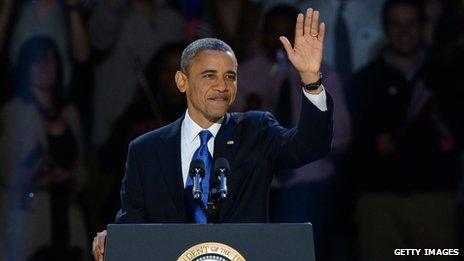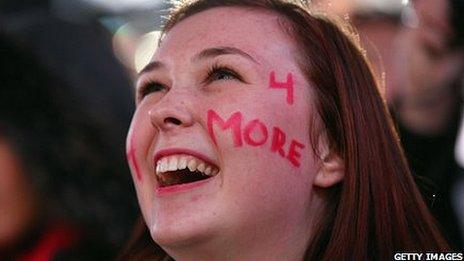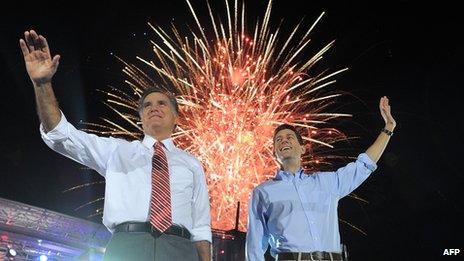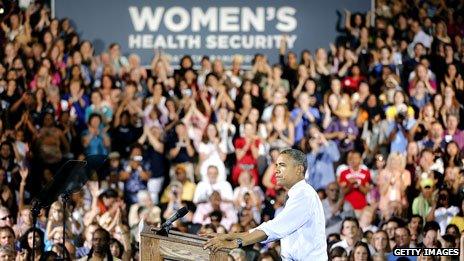US election: A vote for the status quo
- Published
- comments

After the longest and most expensive election campaign any democracy has ever seen, President Barack Obama was re-elected, albeit by a narrower margin than he received four years ago.
Despite America's weak economy, high unemployment and partisan rancour, voters returned incumbents to office in the White House and Congress, kept the same the balance of party power in Congress, and squarely embraced the status quo.
President Obama won re-election with unemployment at 7.9% - the highest any incumbent seeking re-election has faced since Franklin D Roosevelt.
And no incumbent since Roosevelt has held onto office amidst such a bad economy - not Gerald Ford, Jimmy Carter or George Bush Sr.
Bucking the tides of history, however, is not the same as earning the kind of mandate that will intimidate the opposition party.
The final popular vote is not in yet, but it appears Mr Obama will have just a minute margin over Mr Romney.
The president will again face a Republican House of Representatives, though he will have a few more Democratic senators to help him.
Gridlock and intense partisanship may well be part of the status quo that endures in President Obama's second term.
That will depend partly on how the Republicans in Congress read the election results.
Will they see a weakened president, who squeaked through, and thus carry on with their aggressive, uncompromising opposition?
Or will Republicans be more concerned with their own losses and steer toward a more traditional, conciliatory and co-operative posture in Congress?
Their internal battles between party factions will be as intense as the campaign that just finished.
The Obama White House faces a similar strategic choice, but with a more united party behind him.
A "fiscal cliff" is looming - a difficult coincidence of expiring tax breaks and federal spending cuts.
Will the president spend his freshly-earned political capital trying to navigate a grand compromise to avoid the "fiscal cliff" and work for negotiated, bi-partisan legislation to govern the country's debt, deficit and spending laws over the next several years?

Or will the White House take a more piecemeal approach, negotiating something small-bore to deal with the "fiscal cliff" elements, but not a grander fiscal blueprint?
A second term does ensure that the hallmark achievement of Mr Obama's first term - Obamacare - will not be repealed.
To the contrary, the president will have four years to tinker with the programme, improve it and institutionalise it.
The success of his healthcare reform programme may not have been an obvious asset in the 2012 campaign, but it is likely to be an enduring accomplishment of his presidency.
Mr Obama will also have the opportunity to influence the Supreme Court long after he leaves office.
The key there is Justice Anthony Kennedy, 75, a Republican appointee who has been the key swing vote on the court. If Justice Kennedy retires, Mr Obama will be able to make an appointment that could give liberals - or at least judges appointed by Democrats - a majority on the court for a decade or more.
Foreign challenges
It is unlikely there will be any major course changes on foreign policy. Anti-terrorism will remain the highest of priorities, the military draw-down in Afghanistan will continue, and there are no indications of a more interventionist policy in Syria.
Barring a strike by Israel on Iran, the US seems set to continue its policy of sanctions and international pressure.
The fate of other issues potentially high on Mr Obama's second term agenda is more unpredictable.
The administration could well make the contentious issues of immigration reform, climate change and financial regulation priorities, for example.
And Republicans could fight Democratic initiatives with all their might.
"There's nothing in the closeness of the popular vote or the minimal change in House seats that would suggest the Republicans will feel any need to alter their oppositional stance," said Stanford University political scientist Morris Fiorina.
Or they could change course and join hands.
If there is any impetus for a spasm of Republican bipartisanship, it could come from a reading of the exit polls and demographic trends.
Women once again voted heavily for Mr Obama by a margin of 55% to 43%. The female tilt toward the Democrats is now deeply etched in presidential elections.

They fought a hard campaign, but there were no fireworks on the night
Non-white voters broke for Mr Obama overwhelmingly. And that population is growing by roughly 2% every four years; the white population is shrinking by roughly 2% every four years.
"The demographics race we're losing badly," Republican Senator Lindsey Graham told The Washington Post, external this summer, in a moment of candour. "We're not generating enough angry white guys to stay in business for the long-term," he said.
Republican shift to right
The Republican Party has deep and emotional divisions, as the Democrats did throughout the 1970s and 1980s.
The Tea Party might have lost some supporters in the House, but they remain potent in the party's primaries, driving the Republicans to the right. The few remaining self-described moderate Republicans have left the Senate, so that centrist pull is gone.
Republicans are not without advantages. They remain the party of business and raise more money than Democrats.
And Republicans again did better with white voters - the biggest block on the board. They have an attractive, younger group of politicians with some national reputation, led by Mitt Romney's running mate, Paul Ryan.
As for Mr Romney, his campaign was methodically organised and well-financed, but he never quite overcame the perception that he was an opportunist without principled political spine.
His own spokesman seemed to prove that point after the primaries, where Mr Romney ran as a hard conservative.
"Well, I think you hit a reset button for the fall campaign," Eric Fehrnstrom said. "Everything changes. It's almost like an etch-a-sketch. You can kind of shake it up and restart all over again."
The etch-a-sketching didn't work. The image of Mr Romney as an extremely wealthy man out of touch with real life in America hardened after a recording emerged of him saying 47% of Americans were, in essence, freeloaders.
On election day, the 72% of voters who earn less than $100,000 a year (£60,000) decisively rejected Mr Romney.

Obama will get a chance to defend, even tinker with, his healthcare programme
His ads and his stump speech were infamous - even by the low standards of modern American campaigns - for stretching, or ignoring, the truth. "We're not going to let our campaign be dictated by fact-checkers," said Neil Newhouse, a Romney pollster. They didn't.
Dollar-fuelled politics
Tough campaigns lead to calls for tough political reforms. And 2012 was a very tough campaign, partly because of its length and the money involved - an estimated $2.6bn (£1.6bn) - mostly spent on TV ads.
Within days of the 2010 mid-term elections, presidential campaigns commenced.
Then an important Supreme Court removed almost all remaining limits on campaign fundraising and spending. Voters were bombarded by TV ads, robo-calls and social media messages, for months and months.
The tenor and tone of political propaganda this year fit the early years of the country, when parties and partisans controlled the newspapers and pamphleteers.
The negativity and lying that marked this campaign was not a new low for American politics. It was a very old-style low, but with new volume, thanks to new technology - and billions of dollars.
There will certainly be a move for election reform. It will be interesting to see if President Obama leads that effort.
In 2008, Mr Obama was something of a Rorschach test for his supporters - a vessel for hopes, ideals and aspirations. His election as America's first black president was an emotional, prideful moment for the country.
But his first term was dogged by the worst economic conditions since the Great Depression.
Healthcare reform may well be the most consequential legislative action since the Great Society in the 1960s. But voters remain divided over it.
Mr Obama's Republican opponents fought him every step. Throughout the campaign year, Mr Obama appeared to lack the stature his accomplishments might seem to demand.
"No-one is fair to President Obama," the conservative columnist David Brooks wrote last week, external.
"People grade him against tougher standards than any other politician. But his innate ability justifies that high standard," he said.
Tested and tempered by four years in office, the worst of the economic crisis behind him, and free of the burden of facing re-election, Mr Obama could be a very different leader in his second term.
But the Washington he must operate in is very much unchanged by the results of the 2012 elections.